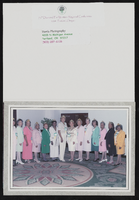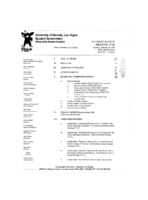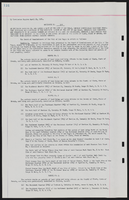Search the Special Collections and Archives Portal
Search Results
Henry and Anita Schuster Papers
Identifier
Abstract
Collection is comprised of correspondence, speeches, essays, meeting minutes, photographs, research materials, publications, press clippings, awards, and event programs (1941-2011) that document the life of Henry Schuster, and his work with his wife Anita. Materials are mainly related to the Holocaust and to Holocaust memory and survivor organizations (especially the Holocaust Survivor's Group of Southern Nevada, which the couple founded, and L’Œuvre de Secours aux Enfants). Genealogical information is also included, as well as records of Henry Schuster’s time in the U.S. Army and his studies at the Manhattan Technical Institute.
Archival Collection
Byrd Wall Sawyer Collection
Identifier
Abstract
The Byrd Wall Sawyer Collection primarily consists of Byrd's research files on Nevada from 1930 to 1970. The materials concentrate on her monograph, "Nevada Nomads," as well as her co-authored textbook, "Here is Nevada." The collection also includes speeches, journal articles, memos, research note cards and papers, correspondence, informational booklets and pamphlets, maps, photographs, audiovisual materials, and newspaper articles and clippings.
Archival Collection
Pueblo Grande de Nevada Manuscript Collection
Identifier
Abstract
The Pueblo Grande de Nevada Manuscript Collection (1924-1983) contains journal articles, photocopies of artifact inventories, reports, correspondence, and field notes related to the Pueblo Grande de Nevada archaeological site located in the Overton Valley of Southern Nevada. The bulk of the materials are related to Mark R. Harrington's archaeological reports, journal articles, and data from sites throughout the Overton and Moapa valleys. The collection also includes materials related to the Boulder Dam Park Museum (Lost City Museum of Archaeology) located in Overton, Nevada, which housed many of the artifacts and photographs from Harrington's archaeological sites.
Archival Collection
Chester R. Longwell Professional Papers
Identifier
Abstract
The Chester R. Longwell Professional Papers (1886-1974) document Longwell's professional career as a geologist and his pioneering field work in Clark County, Nevada. Included are Longwell's field notes; manuscripts, articles and speeches related to geology; personal and business correspondence; professional publications; subject and name files; specimen tags; photographic prints, negatives, and slides; and geological and topographical maps, primarily of Nevada, California, Arizona, and Utah.
Archival Collection
Edgar Flores (Nevada Legislature, Assemblyman) oral history interview conducted by Magdalena Martinez and Facundo Bentancourt: transcript
Date
Archival Collection
Description
From the Lincy Institute "Perspectives from the COVID-19 Pandemic" Oral History Project (MS-01178) -- Elected official interviews file.
Text

Alpha Kappa Alpha Sorority 75th Far Western Region conference materials
Date
Archival Collection
Description
From the Alpha Kappa Alpha Sorority, Incorporated, Theta Theta Omega Chapter Records (MS-01014) -- Chapter records file.
Text

Ernest Oon oral history interview: transcript
Date
Archival Collection
Description
Oral history interview with Ernest Oon conducted by Cecilia Winchell, Stefani Evans, and Jerwin Tiu on February 16, 2023 for the Reflections: the Las Vegas Asian American and Pacific Islander Oral History Project. In this interview, Oon recalls his childhood in Singapore, where his father worked on the Health and Sports Council for the Singaporean Government and his mother worked as a television assistant producer. Growing up, Oon recalls being very active, participating in everything from soccer to Tae Kwon Do. In an effort to continue his education without being being interrupted by Singapore's civil service program, Oon applied to college in the United States and ended up attending California State University. Although he was on the medicine track in Singapore, he switched to finance. After a series of jobs within credit banking, he is now a chief credit officer for Bank of Nevada. Throughout the interview, Oon reflects on the changes in his life living in different places, the street food from Singapore, and his unique tennis game.
Text

Donna Robinson oral history interview: transcript
Date
Archival Collection
Description
Oral history interview with Donna Robinson conducted by Barbara Tabach on December 20, 2019 for the Remembering 1 October Oral History Project. Robinson begins by talking about her family and childhood in Pittsburgh, Pennsylvania. She talks about her family life and how she started working at the American Red Cross as a Disaster Program Specialist. Robinson describes her first disaster situation she worked through, later disaster situations, and the different training that is required in order to handle certain situations. Robinson then begins to talk about October 1, 2017, and how she tried to help as many people as possible that night. Then she talks about the long-term effects of the shooting and how it impacted the survivors and the community. She discusses the mental health aspect of the services Red Cross had and how it still continues to serve the community today.
Text

Meeting minutes for Consolidated Student Senate University of Nevada, Las Vegas, February 10, 1997
Date
Archival Collection
Description
Text

